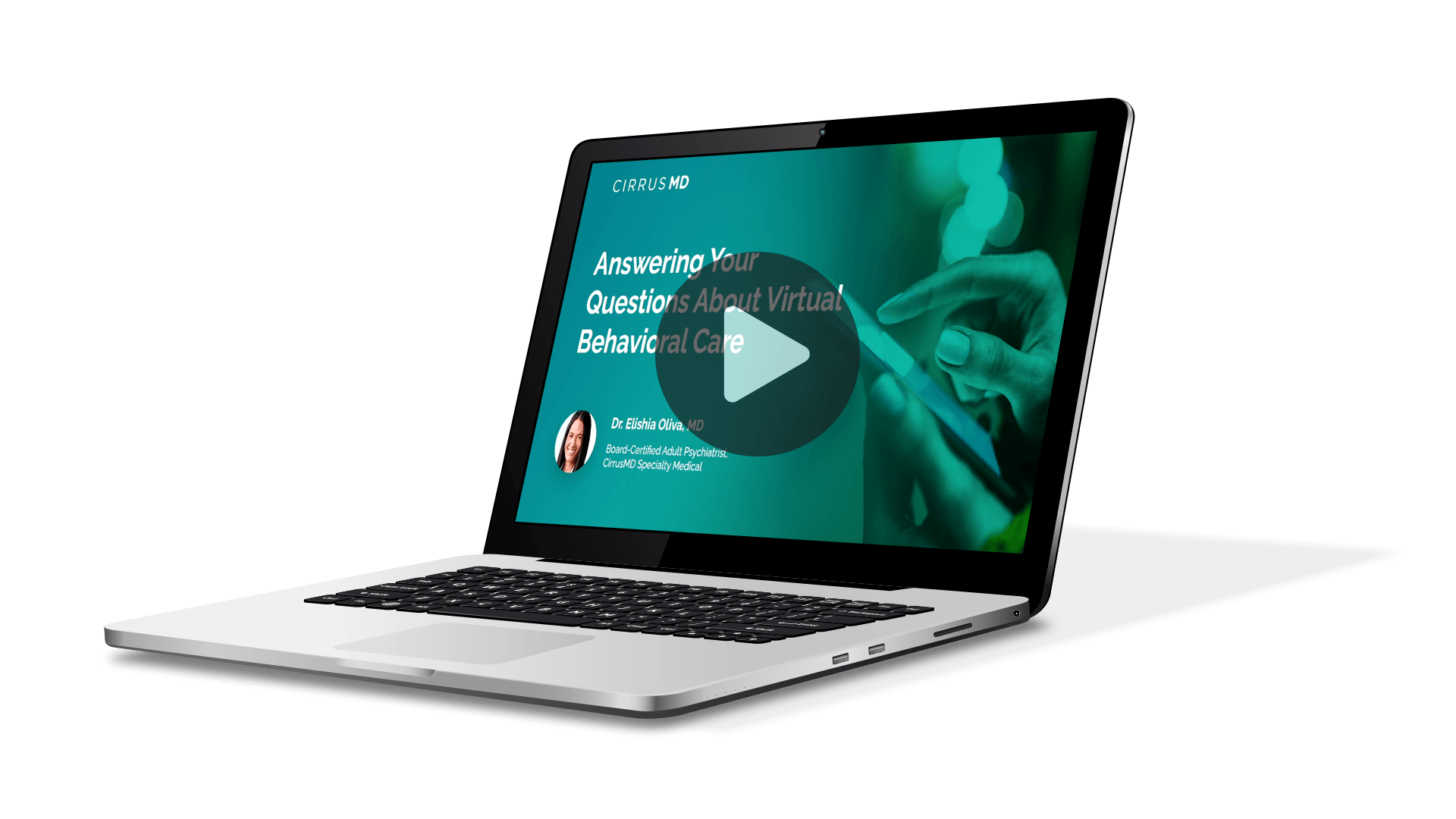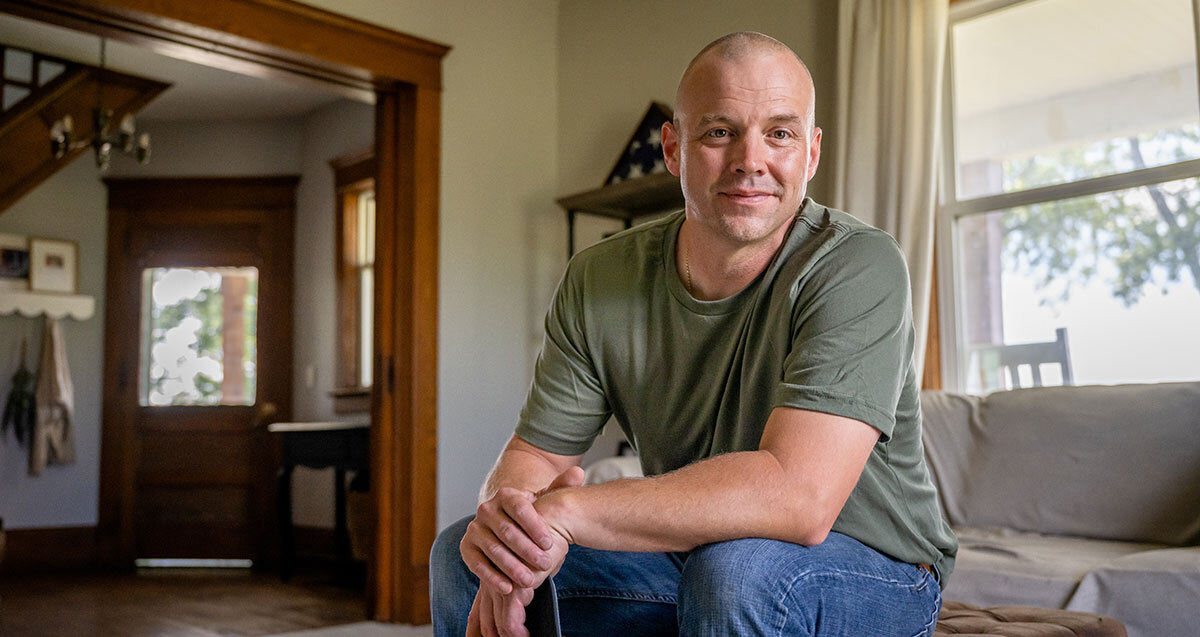
Q: HOW CAN A PATIENT START GETTING HELP WITH MENTAL HEALTH ISSUES VIA TELEMEDICINE?
A: We often find that mental health concerns brought by patients are not yet fully defined. They may be dealing with depression and anxiety, but not fully understand how those symptoms are affecting them or how to best describe what they are dealing with.
We believe in breaking down barriers that hinder access to care. To achieve this, we encourage patients to just start a conversation with a CirrusMD doctor about the symptoms they’re experiencing. A person might say, "I think I might be anxious," and from there, the doctor can begin a conversation to learn more and assess the patient. We have both primary care and psychiatry physicians who can do a deep dive on symptoms and patient history to arrive at a treatment plan.
Q: WHEN A PATIENT COMES ON THE PLATFORM, WHAT KIND OF QUESTIONS WILL THE DOCTOR HAVE ABOUT THEIR MENTAL HEALTH?
A: When a physician starts to assess a patient’s current mental health concerns, it may seem like we're asking a lot of questions because it is very important that we understand the history as well as the current symptoms.
We go through psychiatric history, family history, medical history, substance use history. Understanding medical history allows us to sort out medical problems that may be untreated and contribute to current symptom presentation. Going through family history helps us understand risk for our patients and what they may be predisposed to.
We will ask in detail about the history of the current symptoms and how the patient is experiencing them. Depression, for example, is not the same for everyone. It’s important for each individual to tell their story and how their symptoms affect them.
With regard to psychiatric history, we want to understand if this is a first time occurrence or recurring, what treatments have or have not worked before, and whether or not symptoms have ever become so severe that they required psychiatric hospitalization or resulted in self harm or a suicide attempt. These questions help the physician understand symptom severity and risk, especially around future suicide attempts.
Those are all very serious questions, because it’s vitally important we understand the severity of symptoms and safety. We encourage complete honesty from our patients when assessing safety. It can seem scarry to tell a doctor you are thinking of suicide, but it’s important for us to understand, so we can be sure we’re getting patients the help they need at the right level of care.
Mental health conversations are always confidential. However, there are some instances where we have to break confidentiality, such as when a person states they intend to harm themselves or another person. We want people to know that we’re seeking to understand without judgment, so we can provide the best treatment plan and care going forward.
Q: WHY IS IT SO IMPORTANT TO KNOW ABOUT A PATIENT’S SUBSTANCE USE AND FAMILY MENTAL HEALTH HISTORY?
A: Depending on the symptoms a patient is discussing, it’s possible there may be more than depression or anxiety causing the presenting symptoms. There may be family history of bipolar disorder or schizophrenia, or other psychotic disorders. This is important to know — it enables the physician to ask more specific questions about hallucinations, paranoia or mania the patient may have experienced. Understanding whether a patient has situational circumstances contributing to depression — or if there is a larger underlying genetic component — helps determine how we may first approach treatment.
Drugs, alcohol and marijuana can all affect mood, depression and anxiety. People often say, "alcohol helps me sleep,” or “alcohol helps my anxiety.” Or I hear patients say “marijuana is the only thing I use that helps me sleep” or “it helps me interact with other people.” It is important to work with patients to help them understand how these substances may seem helpful but may in fact be adversely affecting their symptoms.
We work with patients to understand the quantity of use and risk for more serious adverse outcomes from substance use. Alcohol withdrawal, for example, can actually be life threatening. We also work with patients to understand their willingness to engage in substance use reduction or cessation, and provide resources to help them succeed in those attempts. Our goal is to provide safe care, the best options for the patient, and ensure they understand the whole picture.
Q: DO CIRRUSMD PHYSICIANS USE QUESTIONNAIRES OR SCREENING TOOLS?
A: The doctors at CirrusMD practice evidence-based medicine, so there are certain metrics we use to understand not only what a patient tells us about their depression and anxiety, but also how their symptoms equate to numbers. This is truly important in the work we do.
The first time a patient meets with a CirrusMD physician, we’ll ask the patient to do some simple screening tests for depression (Patient Health Questionnaire - PHQ9), anxiety (Generalized Anxiety Disorder - GAD7), and mood disorder (MDQ). These three standard assessments will help us clearly understand where we're starting.
With this baseline in place, as we move forward with a patient, we’ll ask them to repeat the questionnaires at follow up check-ins. These results help us understand if a medication is working as intended, needs to be adjusted, or another intervention should be considered. We want both physician and patient to understand where we're headed and these questionnaires can help guide that process. The goal is to get a response and eventually, remission.
Q: WHAT MIGHT CAUSE A PATIENT TO NEED IN-PERSON CARE?
A: The simple answer is because someone needs to lay hands on them. This might be due to the severity of their symptoms, or symptoms that aren’t improving.
But a growing factor that’s helping build even better virtual care is home monitoring devices. I have asthma patients today with home pulse oximeter machines that monitor saturation of oxygen. More people have devices to monitor blood pressure and pulse. We have parents with home otoscopes who can share images of their kid’s ear. All these data points can help us tease out the conversation and determine next steps for that patient.
Q: DO PATIENTS WITH MENTAL HEALTH ISSUES ACTUALLY GET BETTER USING TELEMEDICINE?
A: Yes, absolutely. We published a telebehavioral study demonstrating significant clinical improvement in patients experiencing depression and anxiety.
To summarize, there are several key reasons CirrusMD telebehavioral care works so well.
The first is ease of access to mental health treatment. To achieve success, a telemedicine platform must provide a trained, licensed physician, available when the patient needs care. And by breaking down access barriers— especially as people begin to experience depression or anxiety — intervention can happen earlier. We're catching people before their conditions become more severe and potentially before functional impairment. Today, people may wait months to be seen by a care provider, or they may live in a region without local mental health professionals. For these patients who can’t access care, symptoms just get worse and worse while left unaddressed.
The second is the non-judgmental process used by CirrusMD doctors. Our physicians are highly skilled at providing a safe environment where patients can feel comfortable being completely honest. This means physicians can identify issues sooner, and begin helping a patient work toward recovery or better management of their condition.
And finally, the third is that CirrusMD physicians use evidence-based medicine and collectively work to deliver effective and consistently high quality care. I believe that with the telebehavioral health program we deliver, we’re helping patients get access to the right care to help them get better, faster.





